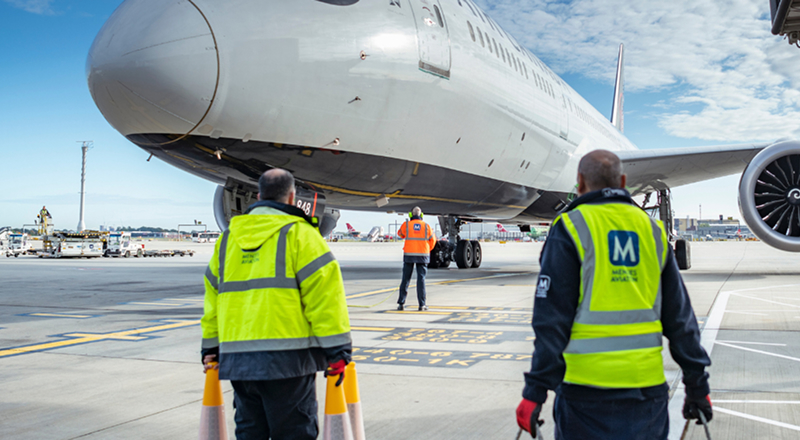How Better Warehouses Increase Trade in Africa

Kuwait-based Agility Logistics Parks customers can log-on to view contracts and make payments.
UK MOD personnel can log-in to the GRMS portal to schedule household relocation shipments.
Kuwait-based Agility Logistics Parks customers can log-on to view contracts and make payments.
UK MOD personnel can log-in to the GRMS portal to schedule household relocation shipments.
How technology is providing a VIP shopping experience for all Q&A with Nadia Akil, CEO of UPAC

E-commerce is disrupting the retail sector. Its growth potential is huge in the GCC, as e-commerce has been slower to gain a foothold here compared to more mature markets. The market is expected to double to $20 billion by 2020.
So what does this mean for brick-and-mortar retail? Malls are a crucial part of the region’s culture. Will a shift to online buying spell trouble for them? Not likely. In fact, some of the same digital innovation driving the change in consumer buying habits is also transforming shopping malls in the Middle East. It’s time to get ready for the super-sized smart mall.
To find out more, we spoke with Nadia Akil, CEO of UPAC, an Agility affiliate and leading investor in Reem Mall, a $1.2 billion retail leisure, dining and entertainment destination set to open in Abu Dhabi in 2020.
It is drastically different from ten years ago. The rise of e-commerce is a huge challenge for retailers. Although its uptake has not been as rapid as in the U.S. or U.K. — e-commerce still counts for just 2% of retail sales in the Middle East — that’s only going to increase. We’re living in a digital world, and brick-and-mortar retailers must embrace this if they’re to survive. I’m not just talking about having an online presence. Retailers need to move to a smart model where the physical act of shopping is combined with a digital experience. As a retailer, you need to look at the customer journey and use technology to improve it and, most importantly, make it personal to them.
Augmented Reality (AR) is a great example of how technology can improve the customer in-store experience. Sometimes when browsing clothes you want to see what they look like, but don’t want the hassle of actually trying them on. Shops can offer an AR experience through augmented dressing rooms, or via a smartphone app. AR is already a hit with consumers – according to a study by Interactions , 61% say they would prefer to shop at a store that offered AR over those that don’t.
If shoppers enjoy trying items on but want a better experience, smart mirrors are the answer . Interactive fitting rooms kitted out with “magic” mirrors automatically recognise products through RFID tags. These are synched with store inventories, so if a customer wants a different size or style they can request it. The mirror image can also be captured on camera, allowing the shopper to easily seek a second opinion from friends via social media.
Robots aren’t being utilized past the self-checkout stage for now, but it’s only a matter of time before consumers can enjoy their own “personal shopper” robot in store.
Data and analytics play a key role here. Retailers who have an online offering can use this data to encourage their customers to visit the store through personalized promotions. Physical stores can also maximize on the point of sale, encouraging consumers to spend more by sending targeted offers to their mobile phones through digital signage, and based on what they’re trying on in the dressing room or have in their baskets.
Personalizing the customer journey will be crucial to the survival of physical stores because it’s everything from the customer’s perspective. Nearly all consumers (91%) are more likely to shop with brands that recognize and remember them, and that provide relevant offers and recommendations, according to a study by Accenture.
Retailers need to be able to rely on super-efficient supply chains. If they don’t have a product a customer wants in stock they need to be able to get it to them ASAP. Shoppers who want purchases delivered to their doors need retailers with super-fast delivery services.
In response to this need, technology is transforming the logistics sector and enabling it to operate at high-speed. Warehousing is more efficient thanks to big data, automation and robotics. The challenges of the last mile are being overcome by the gig economy and SMEs who collaborate with retailers to ensure last-mile delivery in under an hour.
In the Middle East, the mall is so much more than a place to shop. Malls are a key part of our culture, places you go to spend time with your friends and family. But to survive in the digital world they must embrace technology and use it to enhance the visitor experience.
In the smart mall, technology is everywhere. From the digital and interactive signage throughout to the tablet you order your lunch from in the food court. Malls can enhance the experience with apps that engage customers by letting them know about events at the mall, the latest offers and promotions in stores, and helping them locate services and find friends who are also visiting that day.
We’ve touched on AR, but VR (Virtual Reality) is also an exciting way for malls to offer immersive experiences to visitors. VR lets customers try out products in a way they couldn’t anywhere else, taking the retail experience to a new level. Say you’re buying an outfit for a special occasion, VR allows you to try it on and test it out “on location.” Buying new sports equipment? VR puts you on the tennis court or golf course, ready to swing your racket or club.
Smart malls can also overcome pain points for shoppers by offering parking assistance and delivering purchases to cars to free up shoppers throughout the day.
Finally, malls should be mindful of social media opportunities and integrate these into their design and layout. You need Instagram-friendly displays, and interactive features that users can synch with their social media accounts.
Consumers want bigger and better experiences and this is where mega-malls come into their own. Their sheer size makes them destinations in their own right.
At Reem Mall in Abu Dhabi we will be offering a range of entertainment activities such as Snow Park Abu Dhabi, the region’s largest indoor snow park where visitors can enjoy sledding, luge runs and zorbing! In a mall! Now that’s an experience. Reem Mall will also be home to the award-winning VOX Cinemas, including the large format MAX screens, fine dining Theatre by Rhodes and the children focused VOX Kids. For the first time, VOX Cinemas will be fused with Magic Planet creating a unique leisure destination. In addition, Reem Mall will house a variety of around 100 food and beverage options ranging across fine dining, family style, casual dining, cafes, fast food, pâtisseries and coffee shops, all located throughout the mall.
Malls really are places where the family can spend a whole day together being entertained, and where friends can meet to relax and socialize. E-commerce can’t take away from that, but retailers can future-proof their businesses by embracing technology and offering customers an enhanced shopping experience as part of the visitor’s day out.
Absolutely. Disruptive technology is challenging the physical retail sector to up its game, and that’s a great thing. Through digital integration smart malls are offering a VIP shopping experience to all, which I for one will be embracing!